Ryanne Pilgeram
Pushed Out: Contested Development and Rural Gentrification in the US West
Pushed Out: Contested Development and Rural Gentrification in the US West
YOU SAVE £4.34
- Condition: Brand new
- UK Delivery times: Usually arrives within 2 - 3 working days
- UK Shipping: Fee starts at £2.39. Subject to product weight & dimension
Bulk ordering. Want 15 or more copies? Get a personalised quote and bigger discounts. Learn more about bulk orders.
Couldn't load pickup availability
- More about Pushed Out: Contested Development and Rural Gentrification in the US West
Pushed Out explores the effects of rural gentrification on communities, focusing on Dover, Idaho, and the structural forces that drive it. It reveals how social and environmental inequality are written onto these landscapes and offers a radical justice that prioritizes sustainability.
Format: Paperback / softback
Length: 216 pages
Publication date: 11 May 2021
Publisher: University of Washington Press
When a rural community's traditional economic base collapses, it can have far-reaching consequences for the community's residents. The influx of new money and investment can lead to changes in the local economy, job opportunities, and social dynamics. However, not everyone benefits from these changes, and some may be left behind or marginalized.
One of the primary ways in which rural gentrification occurs is through the influx of new money and investment. This can take the form of new businesses, luxury housing developments, and recreational facilities. These developments can attract wealthier individuals and families who are looking for a change of pace or a more rural lifestyle. However, they can also drive up property prices, making it difficult for local residents to afford to stay in their homes.
Another consequence of rural gentrification is the displacement of local businesses and workers. As new businesses and investment come in, they may replace existing businesses that are unable to compete with the new competition. This can lead to job losses and a decline in the local economy. Additionally, the influx of new workers may not have the same cultural or social connections to the community as local residents, which can lead to tensions and social divisions.
Social and environmental inequality are also written onto these landscapes as a result of rural gentrification. Wealthier individuals and families may have access to better schools, healthcare, and recreational facilities, while local residents may be left behind with limited resources and opportunities. This can lead to a widening gap between the haves and have-nots and can exacerbate existing social and economic disparities.
Pushed Out: The Transformation of Dover, Idaho, offers a rich portrait of a rural community that has experienced the effects of rural gentrification. The book explores the structural forces driving rural gentrification, including geological history, settler colonialism, and histories of power and exploitation within capitalism. The author, sociologist Ryanne Pilgeram, conducts in-depth interviews and archival data to ground the ethnography in a long view of the region.
Pilgeram's analysis reveals the processes and mechanisms that make such communities vulnerable to gentrification. She highlights the ways in which local residents are often excluded from decision-making processes and are left to bear the consequences of gentrification. She also points to the ways in which gentrification can perpetuate social and economic inequality and can lead to the displacement of local residents.
However, Pilgeram also offers a vision of a radical justice that prioritizes the economic, social, and environmental sustainability necessary to restore these communities. She advocates for policies that promote community-driven development, affordable housing, and job training programs. She also calls for a more inclusive and equitable approach to land use and development that takes into account the needs and interests of local residents.
In conclusion, when a rural community's traditional economic base collapses, it can have far-reaching consequences for the community's residents. Rural gentrification can lead to changes in the local economy, job opportunities, and social dynamics, but not everyone benefits from these changes. Social and environmental inequality are also written onto these landscapes, and local residents may be left behind or marginalized. Pushed Out: The Transformation of Dover, Idaho, offers a rich portrait of a rural community that has experienced the effects of rural gentrification and provides a vision of a radical justice that prioritizes the economic, social, and environmental sustainability necessary to restore these communities.
Weight: 308g
Dimension: 152 x 227 x 17 (mm)
ISBN-13: 9780295748696
This item can be found in:
UK and International shipping information
UK and International shipping information
UK Delivery and returns information:
- Delivery within 2 - 3 days when ordering in the UK.
- Shipping fee for UK customers from £2.39. Fully tracked shipping service available.
- Returns policy: Return within 30 days of receipt for full refund.
International deliveries:
Shulph Ink now ships to Australia, Belgium, Canada, France, Germany, Ireland, Italy, India, Luxembourg Saudi Arabia, Singapore, Spain, Netherlands, New Zealand, United Arab Emirates, United States of America.
- Delivery times: within 5 - 10 days for international orders.
- Shipping fee: charges vary for overseas orders. Only tracked services are available for most international orders. Some countries have untracked shipping options.
- Customs charges: If ordering to addresses outside the United Kingdom, you may or may not incur additional customs and duties fees during local delivery.


